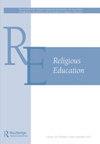他们是谁的孩子?浅谈儿童宗教教育的责任
IF 0.4
3区 哲学
0 RELIGION
引用次数: 0
摘要
2023年REA年会的主题是围绕“他们是谁的孩子?”这一问题来探讨我们承担和/或分配儿童宗教教育责任的多种交叉方式。在这篇文章中,项目主席反思了个人和学术经历和问题,这些经历和问题已经形成并将继续形成她对这个问题的回答。她建议协会可以采取多种方法(描述性、规范性、想象性、混合性)来找到可能的答案,并邀请参与者考虑当代儿童发展和教育理论的研究如何有助于支持建设性的话语。本文章由计算机程序翻译,如有差异,请以英文原文为准。
Whose Children are They? Talking about Responsibility for Children’s Religious Education
Abstract The REA Annual Meeting 2023 theme is organized around the question, "Whose children are they?" as a way to explore diverse and intersecting ways that we take and/or assign responsibilities for children’s religious education. In this essay, the Program Chair reflects on personal and scholarly experiences and questions that have framed and continue to shape her responses to the question. She suggests that the guild can take multiple approaches (descriptive, normative, imaginative, hybrid) to develop potential answers and invites participants to consider how contemporary research in child development and educational theory might helpfully support constructive discourse.
求助全文
通过发布文献求助,成功后即可免费获取论文全文。
去求助
来源期刊

RELIGIOUS EDUCATION
RELIGION-
CiteScore
0.90
自引率
28.60%
发文量
46
期刊介绍:
Religious Education, the journal of the Religious Education Association: An Association of Professors, Practitioners, and Researchers in Religious Education, offers an interfaith forum for exploring religious identity, formation, and education in faith communities, academic disciplines and institutions, and public life and the global community.
 求助内容:
求助内容: 应助结果提醒方式:
应助结果提醒方式:


